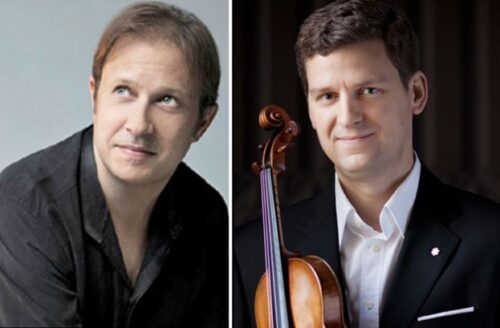 United Kingdom Fauré, Brahms, Messiaen: James Ehnes (violin), Rhian Lois (soprano), Neal Davies (baritone), BBC National Chorus and Orchestra of Wales / Ludovic Morlot (conductor). St David’s Hall, Cardiff, 12.2.2023. (PCG)
United Kingdom Fauré, Brahms, Messiaen: James Ehnes (violin), Rhian Lois (soprano), Neal Davies (baritone), BBC National Chorus and Orchestra of Wales / Ludovic Morlot (conductor). St David’s Hall, Cardiff, 12.2.2023. (PCG)

Brahms – Violin Concerto
Messiaen – O sacrum convivium
Fauré – Requiem
This was an oddly paired programme, half-choral, half-concerto, but it proved attractive fare for the Cardiff audience. They turned out in droves to hear the popular Fauré Requiem and to welcome Canadian James Ehnes in a heartfelt performance of the Brahms Violin Concerto. His appearance in the first half afforded him and the orchestra a standing ovation. His playing was superbly accomplished, and he was fully in command of the screeds of figuration that Brahms and Joachim supplied. In the sensitive accompaniment by Morlot and the orchestra, the balances were carefully judged. The interpretation itself clearly laid emphasis on the classical roots of the music; Ehnes’s delicate tones were never forced or delivered with bluster in the romantic manner. This meant that in places his fast-running passages tended to submerge into the orchestral texture, but the results were always musical. The engineers will doubtless clarify matters when the performance is broadcast on BBC’s Radio 3 in Concert at some future, and unspecified, date.
In the second half, Messiaen’s unaccompanied early choral piece made a pleasant and unexpected curtain raiser for the Requiem. It is in a relatively conventional style, but the sometimes unexpected harmonies give a sense of atmosphere. The solemn text of O sacrum convivium is delivered in an erratically notated rhythm, and that allows the Latin phrases to expand or contract with apparent freedom. The hushed choral tones and the richness of the sound gave a new perspective: the work was originally presumably intended for the cathedral acoustic and for smaller forces. (Full texts and translations of both choral pieces appear in the free BBC programme.)
After the hushed conclusion of the last suspended F-sharp seventh chord in the Messiaen, the opening fortissimo D unison of the Fauré came as something of a shock; and indeed drama was the watchword of this performance, as was lyrical intensity. In the opening bars, Morlot was quite prepared to take Fauré at his word with his tempo indication Molto largo and incredibly slow metronome mark. The return of the same material at the end of the Agnus Dei was heralded with some really rich orchestral playing, despite the reduced number of violins. The score was given in the composer’s full-scale instrumentation of 1900, but the muddy textures – which can result from the divided viola and cello forces – were skilfully avoided and the internal balances were ideally judged. (That had caused problems with the work when I last heard it in this hall with this same choir and orchestra some nine years ago.)
Neal Davies was beautifully poised in his two solos. Even better was Rhian Lois, who not only managed to deliver the tricky opening phrases of the Pie Jesu dead in tune but then allowed her voice to expand with superlative warmth in the final verse; no attempt here to match the timbre of Fauré’s original request for a boy treble! The ‘big tune’ in the Libera me was superbly resonant. The chorus demonstrated that 95 singers (including reinforcement from Welsh National Opera) was not too large a body for a work that we have perhaps recently been too inclined to regard as a chamber piece.
In 2014, I had complained that the piping flutes of the St David’s Hall organ sounded too like a fairground Wurlitzer for comfort in the final movement. Here, with more considerate registration, it made its proper effect. The choral sopranos floated their soaring lines with ease and exquisite taste in exactly the manner required. In the final bars of the Libera me, Morlot introduced a crescendo and diminuendo on the final choral chord, which is not indicated in the vocal score but thoroughly in character with the nature of Fauré’s inspiration. This was typical of the care exercised throughout this thoroughly enjoyable performance, and again the audience gave an enthusiastic reception – after an extended rapt stillness at the end.
Post-pandemic Sunday afternoon concerts can now once again attract large audiences to Cardiff, despite the ongoing problems with public transport. This fact, I trust, was not lost on the members of Cardiff City Council, who are still considering offloading to an outside contractor the responsibility for the maintenance and future of the hall. The online petition against this irresponsible action is open for signatures by those who wish to register their concern. The Council’s plan shows a contempt for the artistic aspirations of the Welsh capital and for its function as a cultural hub for the whole region.
Paul Corfield Godfrey
